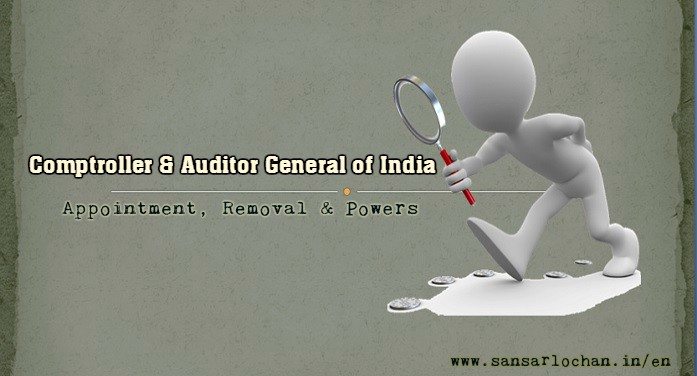The office of the Comptroller and Auditor-General of India may be traced back to the year 1857 when Lord Canning appointed for the first time an Accountant-General to the Govt. of India. Then the office grew in significance and gained independence of the Govt. of India in 1919 under Monftford Reforms when the Auditor-General came to be appointed by the Secretary of State for India. The Govt of India Act 1935 further reinforced the importance and independence of the Auditor-General. The legislature has the power to authorise taxation and expenditure. But to make its control of the purse realistic and effective it must also have the means to keep a watch on the spending operations of the Government. Comptroller and Auditor General of India plays an vital role in operating financial receipts and expenses.
Appointment
Under article 140 (1) the Comptroller and Auditor-General of India is appointed by the President for a fixed term of six years and until he reaches the age of 65 years, whichever in earlier. There are no constitutionally prescribed qualifications for him. He is appointed on objective considerations.
Removal
Comptroller and Auditor General of India can be removed from his office “in like manner and on the like grounds as a Judge of the Supreme Court.”
Oath
Before entering upon his office he is required to make and subscribe an oath or affirmation in the same form as that of Supreme Court Judge and in the prescribed manner and before the specified authority.
Salary
At present he draws the same salary as that of a Supreme Court Judge. The Comptroller and Auditor-General of India is also entitled to the prescribed allowances and a pension and other prescribed retirement benefits. The administrative expenses of his office including his salaries, allowances and pensions are charged upon the Consolidated Fund of India.
Powers
In the office of the Comptroller and Auditor-General of India are comprised both accounting and auditing functions. Article 149 speaks of his powers and duties. Comptroller and Auditor-General of India performs all duties and exercise powers in connection with the accounts of the Union and the States. His main duty is to keep a vigilant watch on the finances of the Union and the States. He submits report to the President and the Governor. He ensures that moneys voted by the legislature are spent under appropriate heads and they are not exceeded or varied.
